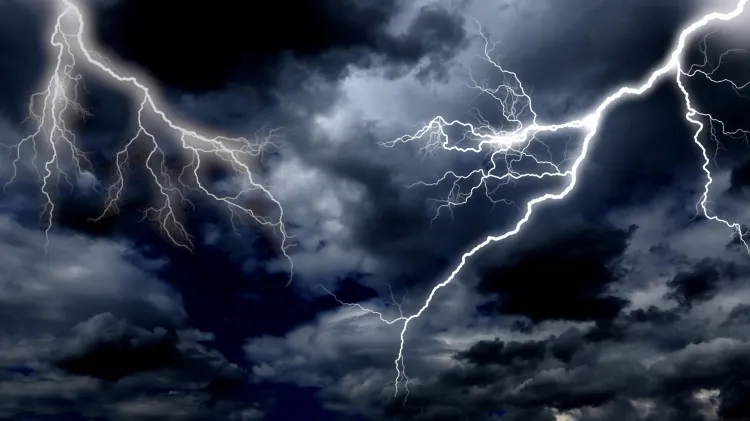Did Lightning Spark Earth's First Life? A New Study Says It Might Have
The origin of life on Earth remains one of the most intriguing scientific mysteries. While theories about hydrothermal vents, primordial soups, and meteorites have dominated discussions, a new study suggests that lightning strikes may have played a crucial role in unlocking the phosphorus needed to kickstart life.

For billions of years, phosphorus—a key component of DNA, RNA, and cell membranes—was locked inside insoluble minerals, making it unavailable for early biological processes. But what if nature had its own way of unlocking this crucial element?
Lightning Strikes and the Phosphorus Connection
Researchers propose that during Earth’s first billion years, frequent lightning strikes could have freed up phosphorus, making it accessible for the formation of essential biomolecules.
Here’s how it worked:
- When lightning strikes the ground, it superheats the surface, forming glassy rocks called fulgurites.
- These fulgurites contain schreibersite, a phosphorus-rich mineral that is soluble in water—an essential condition for early life.
- Over millions of years, these lightning-induced reactions could have produced enough bioavailable phosphorus to support the development of microbial life.
How Much Lightning Are We Talking About?
The study estimates that between 4.5 billion and 3.5 billion years ago, the Earth experienced:
- Up to a quintillion (1,000,000,000,000,000,000) lightning strikes
- Over a billion fulgurites forming annually
- By 3.5 billion years ago (around the time of the earliest fossilized microbes), phosphorus from lightning strikes may have exceeded the amount delivered by meteorites.
Why This Theory Matters
Previously, it was widely believed that meteorite impacts were the primary source of bioavailable phosphorus. Some meteorites contain schreibersite, which dissolves in water, creating conditions necessary for life. However, meteorite impacts declined over time, whereas lightning strikes remained consistent, providing a long-term phosphorus supply.
This study, published in Nature Communications, was led by Benjamin Hess of Yale University, who stated:
"Unlike meteorite impacts, which decrease exponentially, lightning strikes continue at a sustained rate. This means they may have been an important mechanism for providing phosphorus—both on early Earth and on other Earth-like planets."
What This Means for Extraterrestrial Life
If lightning played a role in Earth’s origins, could the same process be happening on other rocky planets?
- Planets with Earth-like atmospheres and frequent lightning activity may also be unlocking phosphorus.
- This mechanism extends the possibility of life forming on exoplanets even after meteorite impacts become rare.
Examining a Lightning-Induced Fulgurite
To confirm their theory, scientists examined a pristine fulgurite sample that formed when lightning struck a backyard in Glen Ellyn, Illinois. Their analysis showed that fulgurites indeed harbor significant amounts of schreibersite, reinforcing the idea that lightning could have contributed to early phosphorus availability.
Dr. Jason Harvey, co-author of the study and associate professor of geochemistry at the University of Leeds, added:
"Our research shows that bioavailable phosphorus production by lightning strikes has been underestimated and provides an ongoing supply of material for the initiation of life."
Did Life Begin in Shallow Waters or Deep-Sea Vents?
While scientists generally agree that the earliest microbes emerged in Earth’s primordial waters, there is still debate about where exactly life began:
- Shallow warm pools (where lightning-based phosphorus production could have been a key factor).
- Deep-sea hydrothermal vents, where chemical-rich environments provided the necessary ingredients.
Hess clarified that this model applies mainly to terrestrial environments, as phosphorus from lightning would likely have had a negligible impact on the vast ocean.
Conclusion: A Bolt from the Blue?
The idea that lightning may have played a role in life’s origins presents a fascinating new perspective on Earth's history. Whether it was lightning, meteorites, or a mix of factors, this research highlights how natural processes shaped the conditions for life to emerge.
With further studies, scientists hope to unravel more secrets about how life began—not just on Earth, but potentially on other planets as well.
Do you think lightning was the spark of life? Or do you believe another theory holds stronger ground? Share your thoughts in the comments! ⚡
What's Your Reaction?
















